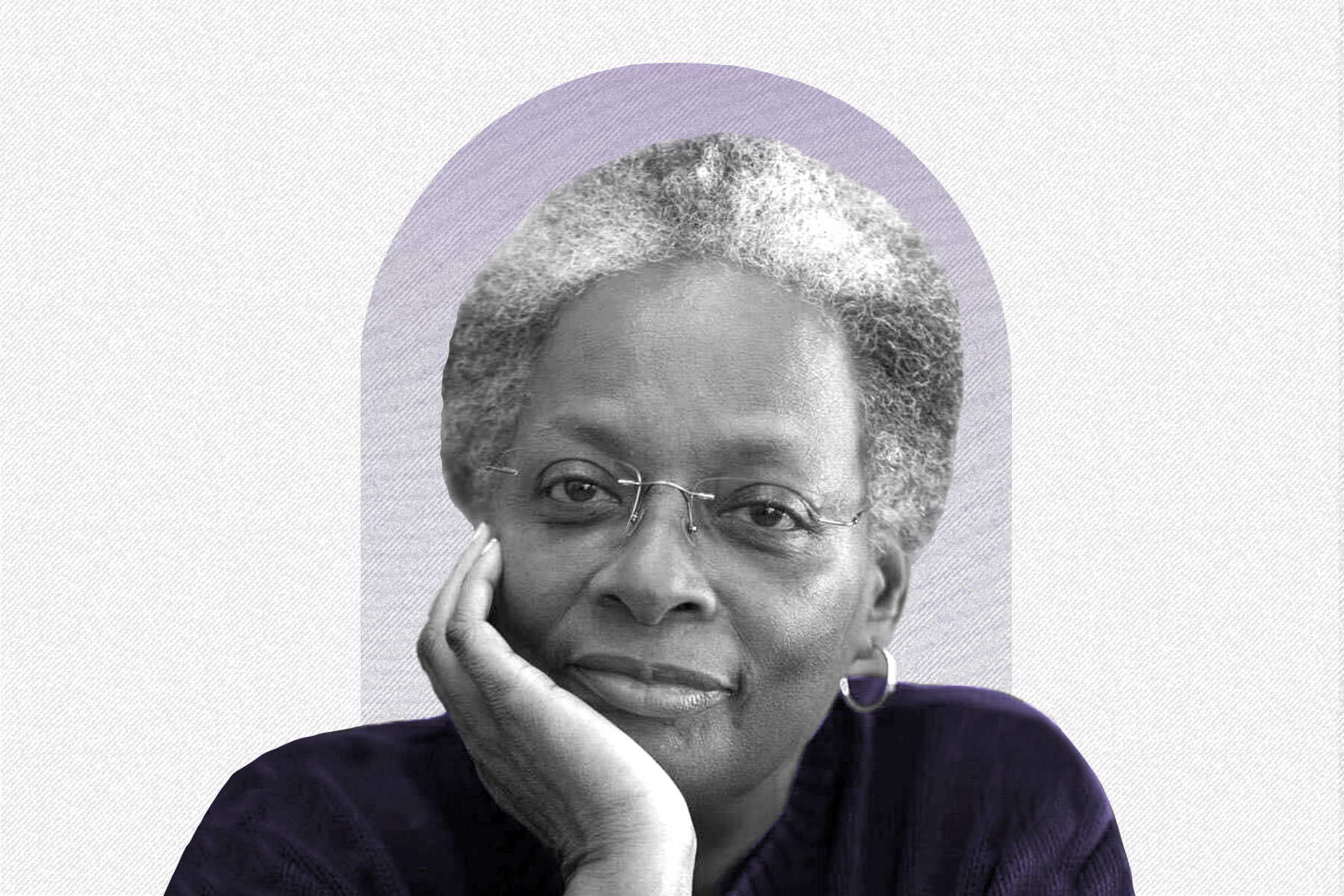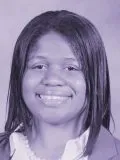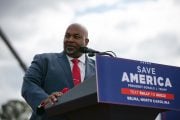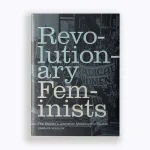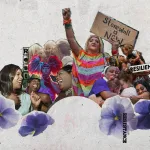This Pride Month, we’re telling the untold stories of LGBTQ+ people. Subscribe to our daily newsletter.
In 1990, one of the most racially charged political races in recent history was taking place in North Carolina. Harvey Gantt, the first Black mayor of Charlotte, was challenging incumbent U.S. Senator Jesse Helms, a stalwart racist who proudly opposed any type of civil rights legislation.
At the time, Mandy Carter, a Black lesbian activist, was organizing N.C. Senate Vote ’90, a statewide campaign funded by lesbian and gay people in the North Carolina triangle region who were working to defeat Helms.
Ultimately, Helms won the race. But, Carter notes, the movement that began with the goal of defeating Helms propelled LGBTQ+ activists in the state to “fall forward.” They began to think more deeply about what it means to be an LGBTQ+ person living in the South and why it was important to come together to fight for liberation.
Thus, in 1993 — 30 years ago this year — Carter, along with Suzanne Pharr, Joan Garner, Pat Hussain, Mab Segrest and Pam McMichael came together to form Southerners on New Ground (SONG), a Queer liberation organization that uses community organizing to fight for economic and racial justice in the South.
The 19th spoke with Carter about her work with SONG, what she has learned over the past 30 years and what she hopes the organization will accomplish over the next 30 years.
Rebekah Barber: Southerners on New Ground was founded 30 years ago. Can you talk about what brought you and the other founders together? At the time, what were your hopes for the organization?
Mandy Carter: The six founders, we all knew each other already, but the founding of SONG really all stemmed back to the Jesse Helms/Harvey Gantt U.S. Senate race in 1990. We did a lot of organizing around that race that got the attention of the National [LGBTQ] Task Force.
They do a conference each year called Creating Change. The conference was started by the National [LGBTQ] Task Force to create a way for people, once a year from all across the country, to get together and strategize.
Pride Month: Resistance, resilience, recreation and rest
This story is part of our Pride Month coverage. From lived experiences to in-depth Q&As and survey data, we’re focused on telling stories highlighting themes that reflect the complexity of emotions elicited by this moment in time. Explore our work.
Because of the success of what happened with that 1990 campaign in North Carolina, it was the first time they ever had Creating Change in the South — in Durham, North Carolina.
When they asked to have it in Durham, we said yes. The plan was actually originally for us to do a workshop, but in addition to having the conference proactively chosen to be in Durham, Mab Segrest (another founder of SONG) got to be one of the keynote speakers. Her speech was about what it means to be gay and lesbian in the South with other southern connections.
We also did the workshop, and that workshop really ended up being the genesis of what we ended up calling Southerners on New Ground because there was so much reaction to it.
That Harvey Gantt/Jesse Helms race will have to go down as one of the most provocative races in history. There’s a concept of losing forward. Even though Harvey Gantt didn’t win — he was the first Black mayor of Charlotte, he helped integrate Clemson [University] — the organizing that went around that race ended up forming such an amazing coalition. Even though Helms won, strategically, that election ended up being a game changer.
-
Read Next:
Since that time, some of the same fights are still going on. Can you talk about some of the important organizing lessons you’ve learned over the past 30 years?
When we first started, we purposely made sure that we started SONG with three White southern lesbians, out and visible, and three Black southern lesbians, out and visible. We thought that was critical for our work.
But then we started talking about it and realized that it wasn’t just about being Black and it wasn’t just about being gay or lesbian. It was about the issues of being in the South. It was about the issues around health, money, discrimination.
We purposely wanted to make sure that one of the first things we did was not a queer issue, per se. We wanted to show how the gay and lesbian community could support an economic issue of farmworkers/people of color.
At the time, farmworkers employed at the Mt. Olive pickle company, the largest independent pickle company in the United States, were fighting for higher wages and safer working conditions. They wanted to do a march, just like the freedom struggles of the civil rights movement.
Mab and I went and walked with the farmworkers in Mount Olive to Raleigh, North Carolina. We don’t speak Spanish. All the meetings they had, they had people speaking Spanish, but for the first time, we had to put the headsets on to receive translation from Spanish to English. That was one of the first important things that happened. Culturally, that was a game changer because it brought us together. It was a bonding moment, and I almost get chills thinking about it.
In retrospect, 30 years looking back on it later, the fact that one of the first things that SONG did officially was something in North Carolina around farmworkers, equality and jobs — that made a big difference.
SONG describes itself as a queer liberation organization. When you think of liberation, what does it look like for you?
Rather than trying to find the things that separate us, what are things that no matter what language you speak or where you live, what would you have in common? I think when I hear the word liberation, whether you put queer in front of it or not, a lot of it is about language justice. A lot of it is about clean air, water. It is the understanding that no one should be homeless — no one.
Everyone should have access to an education, health care. … All the things that you would perceive to be quality of life, whether you’re living in eastern North Carolina with 10 people or New York City with 10,000 people.
Then I would almost pose a rhetorical question: But who gets to define that? Who gets to say if you do or don’t live in these boundaries you may or may not end up in jail?
-
Read Next:
In recent years, SONG has engaged in bailouts — combating the incarceration system by paying the bail of incarcerated people. Can you talk about why efforts to end mass incarceration are so important to SONG’s work?
The original mission statement of SONG was “Southerners on New Ground is about building transformative models of organizing in the South that connect race, class, culture, gender, sexual orientation.”… Later, more people started adding other things like language justice, but the commonality of who’s sitting in those prisons remained the same. The people sitting in those prisons were pretty much either poor White folk or Black folk and other people of color.
One of the thoughts that came out of SONG was, “What if we were to do a bailout project?” They also said, “Let’s go down, for one day, just sit in that downtown courthouse and see the color and class of the folks going into those rooms: all Black, Brown and poor White. That was like an awakening.
Someone said, “What if we had the funds to bail women out so they could take care of their family and children?” That ended up being an experiment, but it worked — and it had a lot of power. They replicated that across other parts of the state and country.
In many cases just $200 made the difference between whether or not a person was incarcerated pretrial. Many of those we were able to bail out were from women-led households. When we were able to bail out these women, we also challenged the whole notion about why these people were in jail. They should not be sitting in there, they can just wait until the trial comes up.
-
Read Next:
Can you talk about what your hopes for SONG are over the next 30 years?
I always say that, ideally, any of us involved in social justice, we should try to be putting ourselves out of a job. One thing I loved about SONG, even though we had the six original cofounders, it wasn’t ours.
There’s a saying, “As the South goes, so goes the nation.” I think a lot of times people write off the South. But the issue of interracial marriage happened in the South (Virginia). The issue of sodomy law happened in the South (Texas).
People often have an idea about where change can happen, but it needs to happen no matter where you live. Some of the legal, cultural, societal changes are actually happening in a place that no one thinks can make a difference. It takes time, but it’s not impossible.
What I would like to see, demographically, is an understanding of how we form more of a cultural bond with other groups like the Latino community and AAPI community.
It’s not just SONG, by itself, but about how we partner with other groups intentionally.
